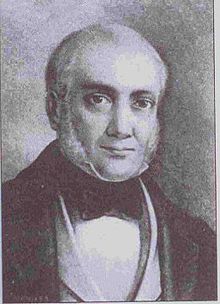Braulio Carrillo Colina
| Braulio Carrillo | |
|---|---|
 |
|
| Head of State of Costa Rica | |
|
In office May 28, 1838 – April 11, 1842 |
|
| Preceded by | Manuel Aguilar |
| Succeeded by | Francisco Morazán |
| Head of State of Costa Rica | |
|
In office May 5, 1835 – March 1, 1837 |
|
| Preceded by | José Rafael Gallegos |
| Succeeded by | Joaquín Mora |
| Personal details | |
| Born |
Braulio Evaristo Carrillo Colina March 20, 1800 Cartago, Costa Rica |
| Died | May 15, 1845 (aged 45) La Sociedad, El Salvador |
| Spouse(s) | Froilana Carranza Ramírez |
| Alma mater | Universidad de León |
| Profession | scribe, lawyer |
| Religion | Roman Catholic |
Braulio Evaristo Carrillo Colina (March 20, 1800, Cartago, Costa Rica – May 15, 1845) was the Head of State of Costa Rica (the title as it was known before the reform of 1848) during two periods: the first between 1835 and 1837, and the de facto between 1838 and 1842.
Before becoming head of state, Carrillo held a number of public positions, including Judge and Chairman of the Supreme Court of Costa Rica, member of the Legislative Assembly of Costa Rica and member of the Congress of the Federal Republic of Central America.
Braulio Carrillo studied law at the University of León in Nicaragua. At the early age of 28 years was elected to the legislature for a period of two years, and for a brief period held the position of president of the legislature. In 1834, he was sent as a representative of Costa Rica to the Central American Congress, in El Salvador.
Upon the resignation of Costa Rica's head of state José Rafael Gallegos in 1835, Carrillo was elected to complete the term of Gallegos. Because of their strong character and that the assembly repealed in August of that year the Ambulance Act, the cities of Cartago, Heredia and Alajuela took up arms against the government in mid-September, but were defeated after a civil war lasted a fortnight.
Carrillo was a candidate for reelection in 1837, but was defeated by Manuel Aguilar, who was overthrown in 1838 by a cuartelazo. Carrillo again became the Head of State, with absolute powers. He convened a constituent assembly, which, in November, declared that the state was separated from the Federal Republic of Central America, and thus Costa Rica became a sovereign country. The constituent session was suspended in December 1838.
...
Wikipedia
